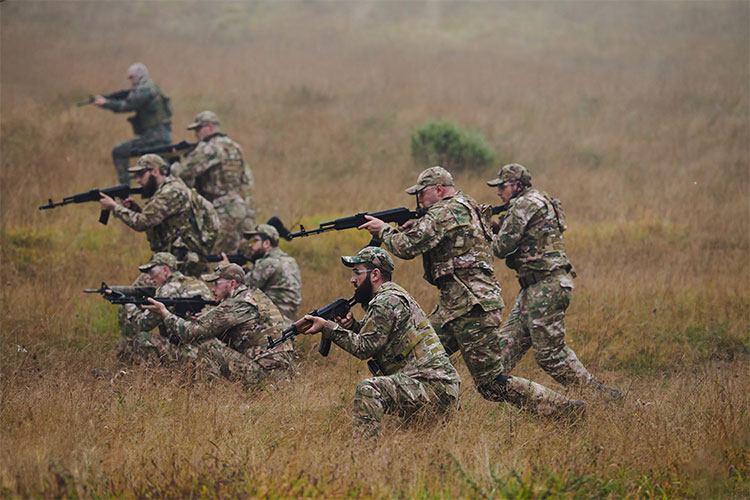Author Recent Posts Rabia Anwaar Latest posts by Rabia Anwaar (see all) Reignited Pak-Afghan Tensions: What Could Be the Way Forward? – November 4, 2025 Geopolitics and the Future of Gaza: Who Are the Real Stakeholders? – October 15, 2025 Iran’s Nuclear Ambitions and Israel’s Aggressive Dominance in the Region – July 15, 2025
Pakistan has got a lot to learn from its past experiences. The past experiences of Pakistan depict that military operations always come up with various challenges and risks, particularly related to life, property, security of the citizens and international standing of Pakistan. Operation Azm-e-Istehkaam, launched by the Pakistani military, is an extension of the ongoing efforts to combat terrorism and insurgency within Pakistan. It is a collaborative effort of all law enforcement agencies. Operation Azm-e-Istehkaam faces numerous challenges such as humanitarian concerns, insurgency tactics, political and social issues, logistical difficulties, international perceptions, and economic impacts on an already faltering economy; all these aspects must be taken into account while conducting this military operation.
The first and foremost important challenge, posed by these operations, is to human security. Humanitarian concerns for Operation Azm-e-Istehkaam in Pakistan primarily revolve around the impact on civilian populations. The risk of civilian casualties is significant in military operations, particularly in densely populated or urban areas where distinguishing between militants and non-combatants can be challenging. Accidental civilian deaths and injuries can erode public support and generate local and international criticism.
Displacement is another major concern. Military operations often lead to large-scale displacement as residents flee conflict zones to seek safety. This displacement can result in temporary or prolonged humanitarian crises, with displaced persons facing shortages of food, water, shelter, and medical care. The lack of adequate infrastructure and resources to support these displaced populations can exacerbate their suffering. The destruction of homes, schools, hospitals, and other critical infrastructure during operations can have long-term detrimental effects on communities. The disruption of education, healthcare, and other essential services can hinder community recovery and development, leading to enduring hardship.
Military operations leave a grave impact on the hearts and minds of people around. One of the drastic effects of such incidents lead to post-traumatic stress disorder (PTSD), a mental condition that is triggered by either experiencing or witnessing a terrifying event. Psychological trauma leads to erode mental health conditions and affects personality of a person over-all. Government must take into account these humanitarian concerns which require careful planning and preparedness for the post-operation support to rebuild and rehabilitate affected communities.
Operation Azm-e-Istehkaam faces several political and social challenges in Pakistan. Politically, maintaining public and political support is crucial. At present, opposition holds reservation in regards to this operation owing to the reason that they were not taken into confidence. However, government takes responsibility to ensure them with transparency of details of this action. Any perception of injustice, such as civilian casualties or destruction of property, can erode trust in the government and military. Political opponents may leverage these issues to criticize the ruling government, potentially leading to political instability.
Government needs to be cautious for maintaining political and public support to make this operation a success. Effective communication and transparency about the operation’s objectives and progress are essential to mitigate these risks. Furthermore, despite of the reassurance by the Prime Minister that this will be unlike past large scale operations causing displacement of people, yet the fear of displacement of populations exists, which can strain social cohesion. Displaced individuals may face difficulties integrating into new communities, leading to social friction and tension.
Even though Operation Azm-e-Istehkaam may not be a large-scale operation, it can still face several logistical difficulties. If it is not going to be on a large-scale, it must be an intelligence-based operation. However, managing logistics will still be a hard task in conflict-prone areas. Even smaller operations need to ensure the security of their supply lines from potential attacks by insurgents or militants. Moreover, establishing and maintaining reliable communication channels between scattered units, especially in areas with poor infrastructure and remote areas is a challenge in this operation.
Operation Azm-e-Istehkaam is also drawing significant international attention, with varied perceptions. It is seen as Pakistan’s firm commitment to combating terrorism internationally. This operation has regional importance as well as for Pak-China bilateral relationship and friendship. However, civilian casualties or displacement can attract criticism leading to scrutiny from global media and international bodies.
This operation might strain Pakistan’s already faltering and fragile economy. The financial burden of military operations including the costs of logistics, equipment, and personnel, strains an already tight budget. Allocating significant resources to the operation diverts funds from essential public services and development projects, potentially hindering economic growth and exacerbating poverty. The disruption caused by military activities can also affect local economies where daily routines and businesses can be halted. Moreover, persistent security concerns can deter foreign investment and tourism both crucial for economic recovery. The operation’s success in stabilizing the region could create a more secure environment conducive to economic activity. However, the immediate economic impact remains a significant challenge for Pakistan’s fragile economy.
Neighboring countries and regional players are monitoring the operation closely as they are concerned about potential spillover effects and the impact on regional security dynamics. For preservation of prestige abroad and political and public support, a balanced approach with minimizing humanitarian fallout is crucial for Pakistan. The operation signifies long-term stability which would eventually foster economic recovery, while the immediate economic impact remains a pressing challenge.
- Reignited Pak-Afghan Tensions: What Could Be the Way Forward? - November 4, 2025
- Geopolitics and the Future of Gaza: Who Are the Real Stakeholders? - October 15, 2025
- Iran’s Nuclear Ambitions and Israel’s Aggressive Dominance in the Region - July 15, 2025





















Leave a Comment
Your email address will not be published. Required fields are marked with *